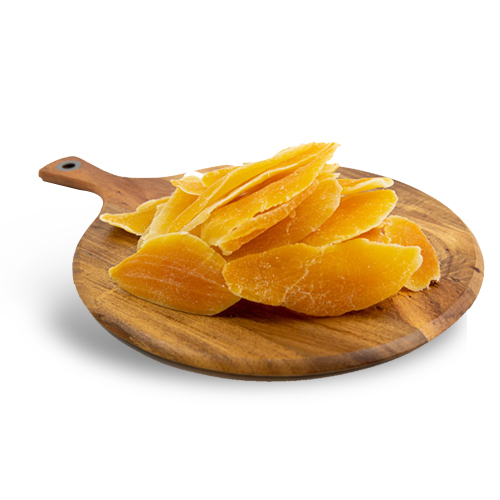[wpb-pcf-button]

Dried Mango Slices Overview
Mangopoint presents dehydrated Mango Slices processed to minimize water content, prolonging shelf life and offering a nutritious snack choice. Our dehydration method focuses on preserving vibrant colors, rich flavors, and essential nutrients, ensuring our products enhance the nutritional value of diverse recipes.
Mangopoint’s dehydrated Mango Slices retain significant nutritional value, including vitamins, minerals, and fiber. However, the dehydration process concentrates natural sugars, underscoring the importance of portion control, particularly for those managing their sugar intake
Specifications
Manufacturing Process
Usage
Health Benefits
Seasons
Nutrition Facts
Specifications
Carton box with inner liner. Quantity- 20 or 25 kgs 23 MT Net can be loaded per FCL. Proper storage is Crucial for maintaining the quality and freshness of dehydrated fruits. Store them in airtight containers or resealable bags in a cool, dry place away from sunlight. When stored correctly, dehydrated fruits can last for several months. 12 MonthsParameter Group
PHYSICAL & CHEMICAL
RANGE VALUE
Refractometric Brix at 20°C
> 16
Acidity As % And. Citric Acid
0.6 to 1.0%
pH As Natural
3.5 – 4.0
Composition / Ingredient
Alphonso mango 100%
MICROBIOLOGICAL
VALUE
Total Plate Count cfu/ ml
< 10,000
Yeast & Mould Count CFU / ml
< 1000
Coliform Count Per ml
< 100
E.Coli
Negative
ORGANOLEPTIC
VALUE
Colour
Light to Bright yellow
Flavour & Aroma
Typical of semi-ripe Alphonso mango without any off flavour
Taste
Characteristics of semi-ripe Alphonso mango fruit
Appearance
Homogenous puree & free of any foreign matter
Packaging
Container
Storage
Shelf – Life
Manufacturing Process
Mangopoint utilizes a vacuum dehydration process to effectively remove moisture from Mangos, preventing spoilage and bacterial growth. This method preserves nutrients while enhancing natural sugars and flavors, ensuring high-quality products.Dried Mango Slices manufacturing process:
Usage
Dehydrated fruits can be eaten as a standalone snack or added to various dishes. They are commonly used in trail mixes, oatmeal, cereals, yogurt, and baked goods like muffins and cookies.Usage of Dried Mango Slices
Health Benefits
Dehydrated fruits can be a healthy part of your diet when consumed in moderation.Health benefits of Dried Mango Slices
Seasons
January
Feburary
March
April
May
June
July
August
September
October
November
December
Nutrition Facts
These values are approximate and may vary based on the specific brand and preparation method of the dried mango.NUTRITIONAL INFORMATION PER 100 gm
PARAMETERS
UNIT
VALUE
Calories
kcal
319
Water
g
14.6
Protein
g
2.2
Carbohydrates
g
82.3
Sugars
g
73.7
Dietary Fibre
g
6.7
Fat
g
1.6
Saturated Fat
g
0.6
Monounsaturated Fat
g
0.5
Polyunsaturated Fat
g
0.2
Vitamin A (Retinol)
µg
54 µg (6% DV)
Vitamin C
mg
36.4 mg (40% DV)
Vitamin E (Alpha-Tocopherol)
mg
2.3 mg (15% DV)
Vitamin K (Phylloquinone)
µg
4.2 µg (4% DV)
Thiamine (B1)
mg
0.1 mg (9% DV)
Riboflavin (B2)
mg
0.1 mg (7% DV)
Niacin (B3)
mg
1.1 mg (7% DV)
Vitamin B6
mg
0.1 mg (6% DV)
Folate (B9)
µg
14 µg (4% DV)
Pantothenic Acid (B5)
mg
0.2 mg (4% DV)
Calcium
mg
73 mg (7% DV)
Iron
mg
1 mg (6% DV)
Magnesium
mg
43 mg (10% DV)
Phosphorus
mg
67 mg (10% DV)
Potassium
mg
670 mg (14% DV)
Sodium
mg
11 mg (1% DV)
Zinc
mg
0.1 mg (1% DV)
